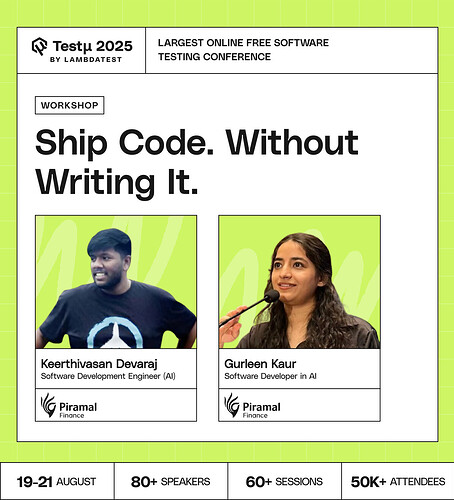Join Keerthivasan, Software Development Engineer - AI at Piramal Finance, and Gurleen Kaur, Software Developer - AI at Piramal Finance, as they showcase how agentic workflows and AI-powered tools are already automating software development, from Jira tickets to real code commits.
Discover how CLINE and custom MCPs enable AI-first engineering, what parts of development can truly be automated, where human input still matters, and how teams are drastically cutting delivery time with prompt-to-code workflows.
 Don’t miss out, book your free spot now
Don’t miss out, book your free spot now
How can QA evaluate the risk level of AI-driven code commits before they are merged? We see tons of code changes in one go.
Do you think no-code tools can really handle complex projects, or will devs always need to step in?
Can we create agent which can generate billions of agent automatically for increasing our productivity?
If AI inside IDEs starts auto-suggesting test cases during development, how do we ensure they are meaningful and not just boilerplate?
What’s the fundamental difference/s between agentic AI and autonomous agentic AI?
Is Cline a Ai-Agent powered IDE for Testing ? How is it different from Cursor or Kiro ?
What new roles/skill sets are emerging within the software development landscape as a result of being able to ship code without writing it, and how should newer developers prepare for this shift?
What are the testing workflow pros and cons for testing low-code and no-code apps?
How does vibe coding use low-code and no-code methodology, and is vibe-code easier to test than other code?
What’s the fundamental difference/s between agentic AI and autonomous agentic AI?
How does AI handle highly domain-specific workflows , for example, EV charging, fintech transactions, or medical imaging, where context is critical and generic models may fail?
How do we stop over-reliance on AI in IDEs, where developers accept suggested tests without questioning their value or coverage?
Cline vs Cursor? Who is the best one?
Can AI agents be tested to defend themselves against threats in real time?
Which kinds of projects might be best to avoid using no-code or low-code workflows for now and in the near future?
Are there unique compliance and regulation risks in using no/low-code and AI workflows? Or to address it, does the process require greater/different human oversight vs. traditional coding?
How can teams quickly test AI agents against real-world threats ?
How do you evaluate if you’ve shipped the right product for the problem at low cost?
what are the benefits of using Claude Agents in GitHub vs Cline or even using Cursor?
![]() Don’t miss out, book your free spot now
Don’t miss out, book your free spot now